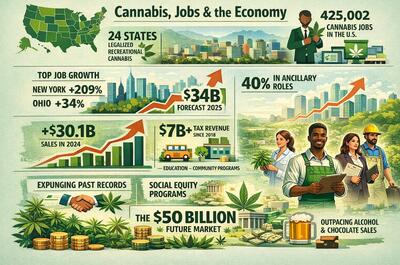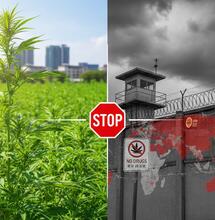Legalization’s Social Impact: Jobs & Economy

Recreational cannabis is now legal in 24 U.S. states, while medical use—at least in some form—is regulated in nearly every other state. With billions in sales and millions flowing into public coffers through tax revenue, the economic upside of state-level legalization is undeniable. But beyond the headlines and balance sheets lies another critical dimension: jobs. How is cannabis legalization reshaping employment, and what does its broader impact look like on long-term economic and social progress?
The transition from an illicit market to a regulated industry has moved beyond a social experiment. Today, the data is clear: cannabis is no longer just a counter-culture hobby—it is a cornerstone of state-level economic development.
The Job Market: From ‘Hypergrowth’ to ‘High-IQ’
If 2024 was the year of the hiring spree, last year marked a switch toward operational discipline. According to last year’s 2025 Vangst Jobs Report, the U.S. cannabis industry currently supports 425,002 full-time equivalent (FTE) jobs.
While that’s a slight 3.4% dip from the previous year, don’t let the numbers fool you—the industry is just getting more sophisticated. The “hiring anyone with a pulse” phase seems to have been traded for a highly specialized workforce.
- The Growth Leaders: If you’re looking for work, head East. New York (+209%) and Ohio (+34%) are currently the industry’s MVP job creators.
- The Ancillary Boom: It’s not just about budtenders anymore. Nearly 40% of the workforce now exists in “ancillary” roles. We’re talking about high-stakes lawyers, compliance tech wizards, and HVAC engineers who specialize in creating the perfect climate for a trillion trichomes.
Economic Growth: The $34 billion Milestone
Money talks, and in the cannabis world, it’s shouting. Despite the “recalibration” of the workforce, sales are still smashing records.
- The Forecast: National sales hit $30.1 billion in 2024 and were projected to climb to $34 billion by the end of 2025.
- The Tax Man Cometh (and Giveth): In mature markets like California, cannabis has already generated over $7 billion in tax revenue since 2018. But the real story is where that “green” is going:
- Childcare & Education: In states like California and Connecticut, hundreds of millions are being funneled into early childhood development and public schools.
- The “Safety Net”: A significant chunk of excise tax is now mandated for youth substance abuse prevention and environmental recovery projects to clean up the impact of illegal legacy grows.
Social Impact: ‘Righting the Wrongs’ is Put to Work
The social impact of legalization isn’t just about more freedoms to get high; it’s also about a massive societal “Ctrl+Z” on the War on Drugs.
- Automatic Expungements: Record-clearing is speeding up. By automating the expungement process, states are removing the “paper handcuffs” that have kept thousands of people from landing jobs or securing housing for decades.
- The Equity Shift: Hopefully, “Social Equity” isn’t just a buzzword in 2026. States like New York have issued hundreds of retail licenses specifically to those disproportionately impacted by past prohibition. The goal? Ensuring the communities that paid the highest price for the “war” are the ones profiting from the peace.
The Ripple Effect: Real Estate and the AgTech Revolution
Legalization is a makeover for the physical world.
- Warehouse Chic: Those “Rust Belt” abandoned warehouses? They’re now high-tech vertical farms. This has sparked an industrial real estate boom that revitalizes forgotten neighborhoods.
- Agriculture 2.0: Because cannabis is so sensitive to light and water, the industry has pioneered AgTech innovations. The water conservation and LED technology developed for a high-end grow op in New Jersey are now being exported to traditional farming, increasing the efficiency of the entire food system.
In a nutshell, the experiment is over, and the results are in. Legalization creates jobs, funds schools, and tries to fix broken legal systems. As we move through 2026, these state-level success stories are more than just local news—they become a blueprint for a national “greenprint.”

FAQ: The Social Impact of Legalization, Jobs and Employment
Q: How does cannabis legalization affect employment?
A: Research suggests that regulating marijuana is linked to improved employment outcomes, especially among young men. One study found a higher likelihood of employment alongside an average 4.5% increase in weekly earnings following decriminalization.
Q: Who benefits the most from these employment and wage gains?
A: Everyone benefits, although African American men appear to experience slightly larger economic gains. According to researchers, removing cannabis-related penalties disproportionately benefits Black adults—particularly men—by reducing barriers to employment and income growth.
Q: What does long-term data say about cannabis legalization and the economy overall?
A: A study supported by the Federal Reserve Bank of Kansas City examined state-level legalization between 2000 and 2020 and found moderate but measurable economic benefits. These include higher average incomes, rising home values, and population growth in legalized states.
Q: What specific economic changes were observed after legalization?
A: Post-legalization data shows average state incomes increasing by about 3%, housing prices by 6%, and population levels by 2%, indicating broader economic momentum tied to legalization.
Q: Are there social downsides associated with legalization?
A: Some research points out to increases in substance use disorders, chronic homelessness, and arrests. However, researchers caution that these trends are not necessarily caused by legalization itself but reflect broader social patterns over the same period.
Q: Are the economic benefits and social costs evenly distributed?
A: Not exactly. While economic gains tend to be spread across the general population, social costs appear more concentrated among heavy cannabis users. States that legalized earlier also saw larger economic rewards, suggesting a possible first-mover advantage.
Q: What does the future hold for the cannabis economy?
A: The cannabis market is projected to approach $50 billion in the coming years. In some states, cannabis sales have already surpassed categories like chocolate—and in certain markets, they’re even on track to outpace alcohol.
More from Soft Secrets:



_11zon.jpg)










